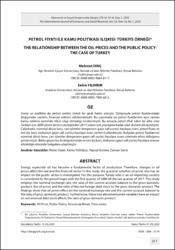| dc.contributor.author | Dinç, Mehmet | |
| dc.date.accessioned | 2021-03-26T08:44:01Z | |
| dc.date.available | 2021-03-26T08:44:01Z | |
| dc.date.issued | 2020 | en_US |
| dc.identifier.citation | Dinç M.,Yıldırım S. (2020). Petrol fiyatı ile kamu politikası ilişkisi: Türkiye örneği. Ekonomik ve Sosyal Araştırmalar Dergisi, 16(1), 317 - 331. | en_US |
| dc.identifier.issn | 1306-2174 | |
| dc.identifier.uri | https://hdl.handle.net/11421/25668 | |
| dc.description.abstract | Enerji ve özellikle de petrol üretim temel bir girdi halini almıştır. Dolayısıyla petrol fiyatlarındaki değişmeler üretimi, finansal sektörü etkilemektedir. Bu çalışmada ise petrol fiyatlarının aynı zaman kamu sektörü üzerinde etkisi olup olmadığı incelenmiştir. Bu amaçla petrol ithal eden bir ülke olan Türkiye için 2000 yılının birinci çeyreğinden 2017 yılının son çeyreğine kadar olan dönem ele alınmıştır. Çalışmada, nominal döviz kuru, cari işlemler dengesinin gayri safi yurtiçi hasılaya oranı, petrol fiyatı ve net dış borç stokunun gayri safi yurtiçi hasılaya oranı serileri kullanılmıştır. Bulgular petrol fiyatlarının nominal döviz kuru, cari işlemler dengesinin gayri safi yurtiçi hasılaya oranı üzerinde etkisi olduğunu göstermiştir. Bahis geçen bu iki değişkeninde ve net dış borç stokunun gayri safi yurtiçi hasılaya oranını etkilediği yönünde bulgulara ulaşılmıştır. | en_US |
| dc.description.abstract | Energy, especially oil has become a fundamental factor of production. Therefore, changes in oil prices affect the real and the financial sector. In this study, the question whether oil prices also has an impact on the public sector is investigated. For this purpose, Turkey who is an oil-importing country is considered for the period begin with the first quarter of 2000 till the last quarter of 2017. This study employs the nominal exchange rate, the ratio of the current account balance to the gross domestic product, the oil prices and the ratio of the net foreign debt stock to the gross domestic product. The findings show that oil prices effect on the nominal exchange rate and the current account balance to the ratio of gross domestic product. Furthermore, these two aforementioned variables have an impact on net external debt stock affects the ratio of gross domestic product. | en_US |
| dc.language.iso | tur | en_US |
| dc.rights | info:eu-repo/semantics/openAccess | en_US |
| dc.subject | Petrol Fiyatı | en_US |
| dc.subject | Kamu Politikası | en_US |
| dc.subject | Yapısal Kırılma | en_US |
| dc.subject | Zaman Serisi | en_US |
| dc.title | Petrol fiyatı ile kamu politikası ilişkisi: Türkiye örneği | en_US |
| dc.title.alternative | The relationship between the oil prices and the public policy: the case of Turkey | en_US |
| dc.type | article | en_US |
| dc.relation.journal | Ekonomik ve Sosyal Araştırmalar Dergisi | en_US |
| dc.contributor.department | Anadolu Üniversitesi, İktisadi ve İdari Bilimler Fakültesi, İktisat Bölümü | en_US |
| dc.contributor.authorID | 0000-0002-7900-6813 | en_US |
| dc.identifier.volume | 16 | en_US |
| dc.identifier.issue | 1 | en_US |
| dc.identifier.startpage | 317 | en_US |
| dc.identifier.endpage | 331 | en_US |
| dc.relation.publicationcategory | Makale - Ulusal Hakemli Dergi - Kurum Öğretim Elemanı | en_US |
| dc.contributor.institutionauthor | Yıldırım, Selim | |


















